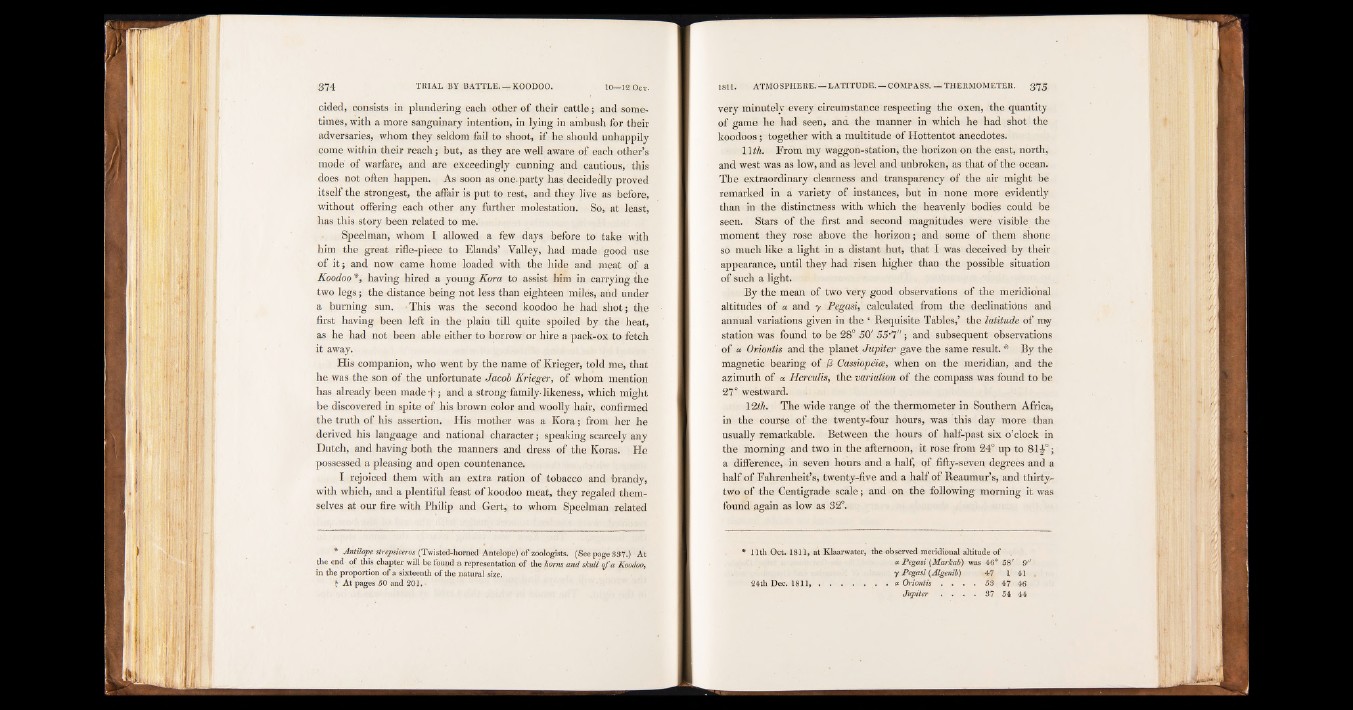
cided, consists in plundering each other of their cattle; and sometimes,
with a more sanguinary intention, in lying in ambush for their
adversaries, whom they seldom fail to shoot, if he should unhappily
come within their reach; but, as they are well aware of each other’s
mode of warfare, and are exceedingly cunning and cautious, this
does not often happen. As soon as one. party has decidedly proved
itself the strongest, the affair is put to rest, and they live as before,
without offering each other any further molestation. So, at least,
has this story been related to me.
Speelman, whom I allowed a few days before to take with
him the great rifle-piece to Elands’ Valley, had made good use
of it; and now came home loaded with the hide and meat of a
Koodoo *, having hired a young Kora to assist him in carrying the
two legs; the distance being not less than eighteen miles, arid under
a burning sun. This was the second koodoo he had shotj the
first having been left in the plain till quite spoiled by the heat,
as he had not been able either to borrow or hire a pack-ox to fetch
it away.
His companion, who went by the name of Krieger, told me, that
he was the son of the unfortunate Jacob Krieger, of whom mention
has already been made-f- j and a strong-family-likeness, which might
be discovered in spite of his brown color and woolly hair, confirmed
the truth of his assertion. His mother was a Kora; from her he
derived his language and national character; speaking scarcely any
Dutch, and having both the manners and dress of the Koras. He
possessed a pleasing and open countenance.
I rejoiced them with an extra ration of tobacco and brandy,
with which, and a plentiful feast of koodoo meat, they regaled themselves
at our fire with Philip and Gert, to whom Speelman related
* Antilope strepsiceros (Twisted-homed Antelope) of zoologists. (See page 837.) At
the end of this chapter will be found a representation of the horns and shill o f a Koodoo,
in the proportion of a sixteenth of the natural size,
{■ At pages 50 and 201, •
very minutely every circumstance respecting the oxen, the quantity
of game he had seen, and the manner in which he had shot the
koodoos; together with a multitude of Hottentot anecdotes.
11 th. From my waggon-station, the horizon on the east, north,
and west was as low, and as level and unbroken, as that of the ocean.
The extraordinary clearness and transparency of the air might be
remarked in a variety of instances, but in none more evidently
than in the distinctness with which the heavenly bodies could be
seen. Stars of the first and second magnitudes were visible the
moment they rose above the horizon; and some of them shone
so much like a light in a distant hut, that I was deceived by their
appearance, until they had risen higher than the possible situation
of such a light.
By the mean of two very good observations of the meridional
altitudes of u and y Pegasi, calculated from the declinations and
annual variations given in the | Requisite Tables,’ the latitude of my
station was found to be 28° 50' 55,hI" ; and subsequent observations
of a Omontis and the planet Jupiter gave the same result. * By the
magnetic bearing of /3 Cassiopéioe, when on the meridian, and the
azimuth of a Herculis, the variation of the compass was found to be
27° westward.
12th. The wide range of the thermometer in Southern Africa,
in the course of the twenty-four hours, was this day more than
usually remarkable. Between the hours of half-past six o’clock in
the morning and two in the afternoon, it rose from 24° up to 81J°;
a difference, in seven hours and a half, of fifty-seven degrees and a
half of Fahrenheit’s, twenty-five and a half of Reaumur’s, and thirty-
two of the Centigrade scale; and on the following morning it was
found again as low as 32°.
* l'ith Oct. 1811, at Klaarwater, the observed meridional altitude of
a. Pegasi (Markab) was 46° 58' 9"
y Pegasi (Algenib) 47 1 41
24th Dec. 1811, . . . . . . . « Oriontis . . . . 53 47 46
JUpiter . . . . 87 54 44